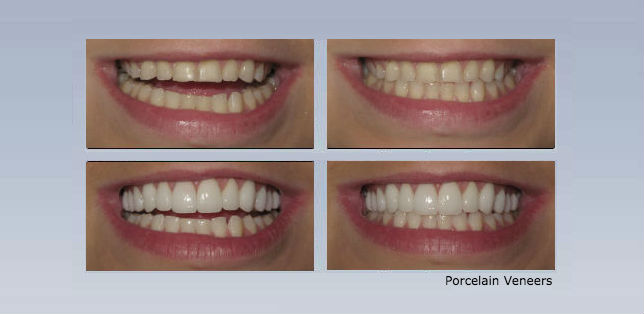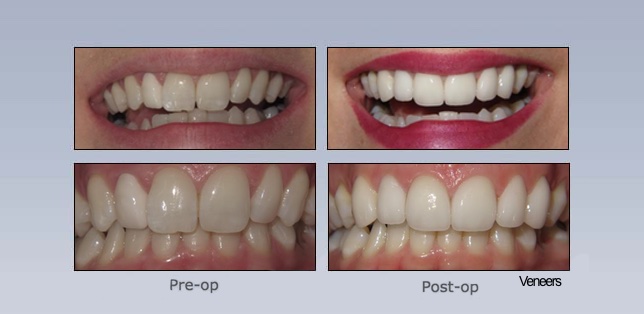Porcelain Veneers in Springfield & Longmeadow, MA Porcelain Veneers Springfield
Get Your Dream Smile With Veneers
An extremely effective and safe cosmetic dentistry procedure, porcelain veneers also known as dental veneers, are an excellent way to mask misshapen, misaligned, cracked, chipped, stained, or otherwise damaged teeth. Taylor Street Dental Associate’s dental veneers in Massachusetts are custom-made of a thin ceramic material designed to fit snugly and discreetly over injured teeth, making dental veneers almost indistinguishable from their natural counterparts.
 An excellent alternative to crowns, porcelain veneers are designed in a dental laboratory to ensure a perfect, custom fit. Dental veneers are easily applied within three dental visits and are resistant to stains and injury. With proper care, dental veneers can last indefinitely! Cosmetic dentist, Dr. David Peck, provides porcelain veneers to patients in Massachusetts, including Boston, Springfield, and Connecticut.
An excellent alternative to crowns, porcelain veneers are designed in a dental laboratory to ensure a perfect, custom fit. Dental veneers are easily applied within three dental visits and are resistant to stains and injury. With proper care, dental veneers can last indefinitely! Cosmetic dentist, Dr. David Peck, provides porcelain veneers to patients in Massachusetts, including Boston, Springfield, and Connecticut.
Call to Schedule an Appointment Today – (413) 781-7645
Porcelain Dental Veneers Before & After Cases
Click Here to View More
Dental Veneers FAQs
What are Dental Veneers?
Dental veneers cover teeth that are discolored or maligned to improve appearance and shape.
What are the Benefits of Porcelain Veneers?
Porcelain veneers have the advantage of covering various cosmetic flaws with a patient’s teeth without having to resort to the more involved procedures, such as orthodontics, that would otherwise be needed to correct the problem. Porcelain veneers can be used for decades to cover the flaws and present a perfect smile.
Porcelain veneers are perfect for covering teeth that have been deeply stained by tetracycline or trauma. These deep stains can’t be whitened with teeth whitening because the staining is in the dentin layer of the tooth. Also, veneers can change the shape of a misshapen tooth or a chipped tooth.
Dental porcelain closely resembles the translucence of natural tooth enamel, so porcelain veneers look very similar to natural tooth enamel. Dental porcelain also doesn’t stain, so your veneers will look great for a long time.
Patient Testimonial
(Google review)
“I have just had veneers put in and they look wonderful. DR Peck is the best!!! No matter what procedure I have had done, I was always comfortable. I always hated going to the dentist, hence the reason for needing so much help getting my oral hygiene up to par. I now have healthy pink gums and a beautiful smile. Dr Peck and all his staff were super patient with me and I recommend to anyone who has a fear of the dentist Dr Peck is 100 percent go to guy for a comfortable experience with top notch work. Me and my family are truly amazed with his work!! Dr Peck is the man and with my new smile I am a new man!!! Thank you Taylor Street Dental!!”
– Donald W.
How Long is the Process of Getting Porcelain Veneers?
Because porcelain veneers need to be custom-made at a dental lab to the patient’s exact measurements, the process of getting veneers takes two appointments. During your first appointment, your teeth are prepared for the veneers. Dr. Peck removes a thin portion of the enamel on the front of every tooth to receive a veneer. This makes room for the veneer on the tooth. Then he takes measurements, photos, and impressions for the lab to use to create your custom veneers. The lab usually takes from two to three weeks to make your veneers. To protect your teeth during this time, Dr. Peck places temporary veneers on your teeth that look natural and mimic the final appearance.
When your veneers are delivered to our offices, you return and Dr. Peck checks the color match with your adjacent teeth and the fit of each veneer. He then bonds them permanently onto your teeth and you’re good to go.
What Happens to my Teeth After Veneers? Will I Get Cavities?
Your teeth become stronger and regain the lost tooth structure when veneers are applied. Cavities can still form at the edges of your porcelain veneers if good oral hygiene is not practiced.
How Strong are Porcelain Veneers? Are There Restrictions to What I Can Eat?
Dental porcelain is very strong and very durable. While there are not any restrictions to what you can and cannot eat, some common sense is a good idea. Using your teeth with veneers to open pistachios, chew bones, chew ice, or bite into sticky caramel apples may or may not cause the veneers to loosen (most likely they would be fine), but those kinds of foods or bad habits, such as biting your fingernails, may contribute to a veneer coming off. Otherwise, you can eat what you want.
How Do I Take Care of my Veneers?
Normal brushing (with a non-abrasive toothpaste) and flossing are all that is required for maintenance of your veneers. Your veneers cannot develop decay, but the areas of the teeth next to the veneers can. But normal, diligent home care is all that’s required.
If I Have my Upper Teeth Treated with Porcelain Veneers, Will my Lower Teeth Still be a Different Color, or More Yellow?
Teeth whitening is recommended prior to any cosmetic treatment to allow color matching of all your teeth and your veneers more easily. If a patient wants their upper teeth with veneers to be whiter than they will not match the lower teeth.
Do Porcelain Veneers Stain with Normal Things like tea, coffee, and wine?
Dental veneers will not stain. However, if a composite veneer is used, these are more porous and will stain. They will also dull over time.
How Long Will Porcelain Veneers Last?
Dental veneers last for years depending on care and upkeep, i.e. regular dental cleanings. A patient’s bite can also affect the longevity and sometimes a night-guard is recommended.
I Grind my Teeth at Night. Will This Damage my Veneers?
If you have bruxism, or nightly grinding of your teeth, you can damage your veneers because you are wearing your teeth down. This is something to discuss with Dr. Peck. He may recommend a night guard to protect your teeth at night if you are grinding your teeth.
Will my Insurance Cover the Cost of Porcelain Veneers?
Porcelain veneers are usually considered to be strictly cosmetic and are not usually covered by insurance. This is something you would need to discuss with your insurance provider.






